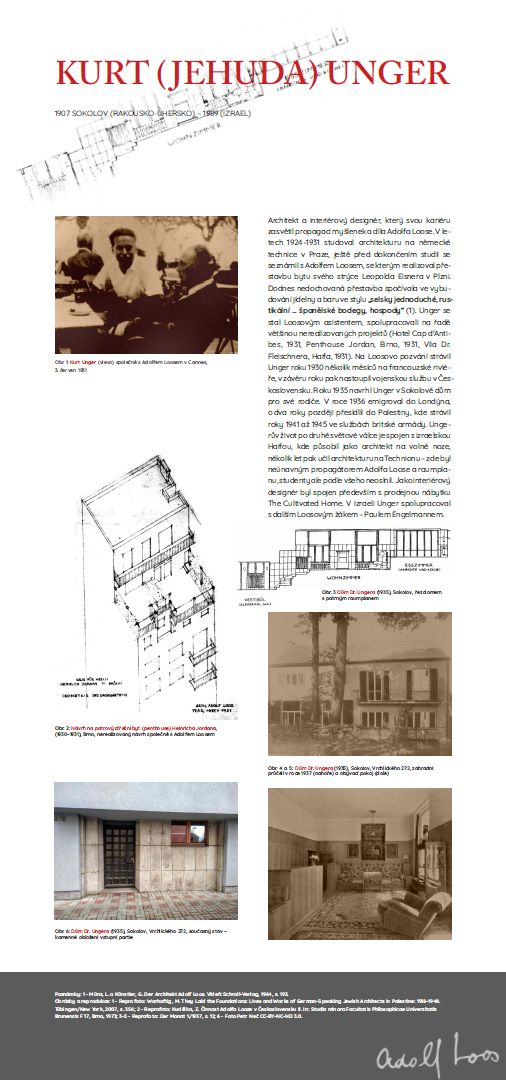Milí návštěvníci, vila je pro vás otevřena vždy v pátek, sobotu, neděli a pondělí. V průběhu ledna se můžete těšit na komentované prohlídky interiéru v 10:00, 12:00, 14:00 a 16:00 hod. Doporučujeme rezervaci. // Dear visitors, the villa is open to the public every Friday, Saturday, Sunday and Monday. In January, you can enjoy guided tours of the interior at 10:00 a.m., 12:00 p.m., 2:00 p.m. and 4:00 p.m. For your convenience, advance booking is recommended.
Následovníci Adolfa Loose / Adolf Loos Followers
Virtuální prohlídka výstavy / virtual tour of the exhibition
Titul | Adolf Loos | Felix Augenfeld | Friedrich Ehrmann | Paul Engelmann | Jacques Groag | Alfons Hetmanek | Heinrich Kulka | Karel Lhota | Margarete Schütte-Lihotzky | Walter Sobotka | Kurt Unger | Jan Víšek | Rudolf Wels | Ernst Wiesner
Kurt (Jehuda) Unger
1907 SOKOLOV (RAKOUSKO-UHERSKO) – 1989 (IZRAEL)
|
Architekt a interiérový designér, který svou kariéru zasvětil propagaci myšlenek a díla Adolfa Loose. V letech 1924–1931 studoval architekturu na německé technice v Praze, ještě před dokončením studií se seznámil s Adolfem Loosem, se kterým realizoval přestavbu bytu svého strýce Leopolda Eisnera v Plzni. Dodnes nedochovaná přestavba spočívala ve vybudování jídelny a baru ve stylu „selsky jednoduché, rustikální … španělské bodegy, hospody“. Unger se stal Loosovým asistentem, spolupracovali na řadě většinou nerealizovaných projektů (Hotel Cap d'Antibes, 1931, Penthouse Jordan, Brno, 1931, Vila Dr. Fleischnera, Haifa, 1931). Na Loosovo pozvání strávil Unger roku 1930 několik měsíců na francouzské riviéře, v závěru roku pak nastoupil vojenskou službu v Československu. Roku 1935 navrhl Unger v Sokolově dům pro své rodiče. V roce 1936 emigroval do Londýna, o dva roky později přesídlil do Palestiny, kde strávil roky 1941 až 1945 ve službách britské armády. Ungerův život po druhé světové válce je spojen s izraelskou Haifou, kde působil jako architekt na volné noze, několik let pak učil architekturu na Technionu – zde byl neúnavným propagátorem Adolfa Loose a raumplanu, studenty ale podle všeho neoslnil. Jako interiérový designér byl spojen především s prodejnou nábytku The Cultivated Home. V Izraeli Unger spolupracoval s dalším Loosovým žákem – Paulem Engelmannem. |
An architect and interior designer who has dedicated his career to promoting the ideas and work of Adolf Loos. In the years 1924–1931 he studied architecture at the German Technical University in Prague; before completing his studies he met Adolf Loos, with whom he rebuilt the apartment of his uncle Leopold Eisner in Pilsen. The reconstruction, which has not been preserved, consisted of the construction of a dining room and bar in the style of a "simple, rustic… Spanish bodega, pub". Unger became Loos's assistant, collaborating on a number of mostly unrealized projects (Hotel Cap d'Antibes, 1931, Penthouse Jordan, Brno, 1931 and Dr. Fleischner's Villa, Haifa, 1931). At Loos' invitation, Unger spent several months on the French Riviera in 1930, and at the end of the year he began military service in Czechoslovakia. In 1935, Unger designed a house for his parents in Sokolov. He emigrated to London in 1936, and two years later moved to Palestine, where he spent 1941 to 1945 in the service of the British Army. Unger's life after World War II is connected with Haifa, Israel, where he worked as a freelance architect, taught architecture at Technion for several years - where he was a tireless promoter of Adolf Loos and Raumplan, but apparently did not dazzle the students. As interior designer, he was primarily associated with the Cultivated Home furniture store. In Israel, Unger collaborated with another Loos’ student – Paul Engelmann. |
